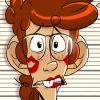
Also posted to: bubblepop
anaracorra asks: How did you learn to draw so well?
There is no magic trick for it. It takes passion, effort and commitment. If you don't feel like you can stick to it, you either won't or will have one tough time. But, the best advice anyone can give you and you'll hear it all the time: Practice, practice, practice. Most people who come to me for advice barely draw. They'll doodle something up once every few days or even one a month. No matter how busy you are, you must draw! While it's of course better to learn and improve, simply by drawing continually will you get better. But you need to learn that it takes time, you will think you're not improving but you are.
This is also important if you're planning on doing commissions. Why? It's a popularity contest! Yes, it doesn't matter how good you are, if no one knows who you are, you won't sell. I see tons of amazing artists who get no work because they post once a month. But, if you post everyday, watch and see how many you get in the end!
amiko asks: Do you have any tips on drawing using a tablet? I've been drawing in pencil, then going over it in pen before scanning it in. I find my lines are really shaky using a tablet.
This is another that has no magic trick. Unfortunately, it usually depends on the person. Most people have trouble with tablets and are shaky, then there's some people like me who really have a steady hand.
The best advice I can give you: Be confident!
Most of the time, I've noticed, people who have shaky lines do short, tiny strokes, they are unsure about it. what you want is long, full, confident strokes. These turn out less shaky.
Tracing can actually help you learn control. Note: I do not mean that you should trace and post it. Only use it as a learning tool and do NOT use it as a crutch. Most people learn to only use that and get in trouble for it. You only want to better yourself with it.
A lot of people don't believe me when I say tracing can help, but it does. My story: When I was younger, I was so shaky that my teachers sat my mother down and told them I most likely would not be able to write at all when I was older. However, I got into the habit of tracing letters and pictures, as well as drawing my own pictures by hand. And look at me now! I'm not longer shaky. This -may- not help you, everyone is different. But it might be worth a try to get out some school books and start tracing those letters!
And if anyone wants to ask more specific questions or needs some clarification, please do feel free to ask. Also note: I myself have a long way to go, I'm not perfect. I don't mean to say that the advice above is the advice you should listen to, but it is what helped me and may help you. It's a good idea to look at what others say as well!
anaracorra asks: How did you learn to draw so well?
There is no magic trick for it. It takes passion, effort and commitment. If you don't feel like you can stick to it, you either won't or will have one tough time. But, the best advice anyone can give you and you'll hear it all the time: Practice, practice, practice. Most people who come to me for advice barely draw. They'll doodle something up once every few days or even one a month. No matter how busy you are, you must draw! While it's of course better to learn and improve, simply by drawing continually will you get better. But you need to learn that it takes time, you will think you're not improving but you are.
This is also important if you're planning on doing commissions. Why? It's a popularity contest! Yes, it doesn't matter how good you are, if no one knows who you are, you won't sell. I see tons of amazing artists who get no work because they post once a month. But, if you post everyday, watch and see how many you get in the end!
amiko asks: Do you have any tips on drawing using a tablet? I've been drawing in pencil, then going over it in pen before scanning it in. I find my lines are really shaky using a tablet.
This is another that has no magic trick. Unfortunately, it usually depends on the person. Most people have trouble with tablets and are shaky, then there's some people like me who really have a steady hand.
The best advice I can give you: Be confident!
Most of the time, I've noticed, people who have shaky lines do short, tiny strokes, they are unsure about it. what you want is long, full, confident strokes. These turn out less shaky.
Tracing can actually help you learn control. Note: I do not mean that you should trace and post it. Only use it as a learning tool and do NOT use it as a crutch. Most people learn to only use that and get in trouble for it. You only want to better yourself with it.
A lot of people don't believe me when I say tracing can help, but it does. My story: When I was younger, I was so shaky that my teachers sat my mother down and told them I most likely would not be able to write at all when I was older. However, I got into the habit of tracing letters and pictures, as well as drawing my own pictures by hand. And look at me now! I'm not longer shaky. This -may- not help you, everyone is different. But it might be worth a try to get out some school books and start tracing those letters!
And if anyone wants to ask more specific questions or needs some clarification, please do feel free to ask. Also note: I myself have a long way to go, I'm not perfect. I don't mean to say that the advice above is the advice you should listen to, but it is what helped me and may help you. It's a good idea to look at what others say as well!
Category All / All
Species Unspecified / Any
Size 800 x 565px
File Size 259 kB
I use to color a bit, but i find myself hitting a wall when recieving lineart without reference of the said character. :|
As for now, i can only do flats and shading's an issue for me, since i picked up a tablet (Bamboo Pen 1st Gen.) and got SAI just like that, without looking deeper into the functions of the program that could help me more.
Without proper guidance, i think, my tablet keeps on catching dust for now.
As for now, i can only do flats and shading's an issue for me, since i picked up a tablet (Bamboo Pen 1st Gen.) and got SAI just like that, without looking deeper into the functions of the program that could help me more.
Without proper guidance, i think, my tablet keeps on catching dust for now.
Your so awesome! I have fould all of what you said true, I have been at it for a while now and it really is a popularity contest... Which at times is a bit discouraging since I am trying to make money but i find the more I post the more watchers I get. But it is motivation like you provide that keeps me going hoping one day to get work from my one true passion.
Absolutely true on all accounts.
I also can vouch for tracing being helpful - I've done it myself and it helped me. In one particular case I used to do vectors for some character models from a cartoon, and doing so made me more familiar with how that art style works, as well as gave me some ideas for how to improve my own art.
I also can vouch for tracing being helpful - I've done it myself and it helped me. In one particular case I used to do vectors for some character models from a cartoon, and doing so made me more familiar with how that art style works, as well as gave me some ideas for how to improve my own art.
There's really no advice on that since no artist can do it. It's because you -think- you know what you imagine in your head, but it's actually not clear so you can never fully show what you want. The best thing is to find existing photos that are similar to your idea to use as reference.
I see this all the time, but I still have one question; "What am I supposed to be practicing?"
Great, practice drawing. I don't see this as much of an answer, more like a cop-out. If I wanted to learn how to, say, build a car, and I asked a mechanic and all they said was to practice, it really doesn't tell me anything. See what I mean? It's a non-answer, a brick wall. What does it mean? There needs to be some sort of a guide.
A lot of the time I get stuck. "Great, now what?" I've only gotten as far as a circle, some basic shapes and sticks. "Where do I go from here?" A long time ago, a friend of mine would put little guidelines on my sketch, and I'd work with them. She was able to guide me to a full figure, as opposed to my generic shapes.
This can be where tracing gets involved (without getting into all the bad things people do with tracing). It can be a useful tool, to gain confidence in oneself if one traces a shape or method with repetition, or simply learning how to draw a specific thing, just until one becomes confidant enough to not need these training wheels. Once one gets confident in stroke, they can begin to develop a style.
This is just my two cents, but I really would like this question answered.
Great, practice drawing. I don't see this as much of an answer, more like a cop-out. If I wanted to learn how to, say, build a car, and I asked a mechanic and all they said was to practice, it really doesn't tell me anything. See what I mean? It's a non-answer, a brick wall. What does it mean? There needs to be some sort of a guide.
A lot of the time I get stuck. "Great, now what?" I've only gotten as far as a circle, some basic shapes and sticks. "Where do I go from here?" A long time ago, a friend of mine would put little guidelines on my sketch, and I'd work with them. She was able to guide me to a full figure, as opposed to my generic shapes.
This can be where tracing gets involved (without getting into all the bad things people do with tracing). It can be a useful tool, to gain confidence in oneself if one traces a shape or method with repetition, or simply learning how to draw a specific thing, just until one becomes confidant enough to not need these training wheels. Once one gets confident in stroke, they can begin to develop a style.
This is just my two cents, but I really would like this question answered.
A mechanic and art is a HUGE difference and I can't compare them. You can't just get better at building a car, it works differently. I can't explain it because I don't know why, but just drawing withought practicing does make you better in the end. So I'd rather not discuss that part.
You misunderstood how I meant it. While I do use the word practice, I also say: "While it's of course better to learn and improve, simply by drawing continually will you get better". Basicly, just draw. It doesn't matter if you know what you're doing or not. You'll get better faster (in most cases) if you know what to work on and if you have someone to teach you, but majority of artists never do this. They draw because they like it and it goes from there.
Me personally, I've never taken classes, only started looking at art books when I was maybe 16 (Anime ones, which aren't helpful) and only sometimes asked friends for advice when I was stuck. Otherwise, all my skill comes from just drawing all the time. If you only draw one once in a while, it's going to be one slow process.
I also said "This is the best advice I can give you", meaning they're is -more- advice to be given that can help on more specific subjects. However, the questioner was not specify and left the question open and I gave the answer that helped me the best personally. Everyone works differently and I don't expect everyone to get better the way I did, some need special attention while others work fine on they're own.
To answer your question: It's a tad personal. I'm not you and I haven't seen what you do, so I don't know what you could need to work on. But while outside critique is great, you are the artist and things look differently to you. They always say that an artists worst critique is themselves. The only thing I can say is sit down and think about what looks off in your art compared to others. How are your hands? Your eyes? If these things look off to you, then that's what you practice. For example, I do know I'm good but I'm no where near amazing/perfect. They're are certain elements that I'm satisfied with that will improve over time alone (eyes), while other things I do need to find the time to practice (backgrounds)
You misunderstood how I meant it. While I do use the word practice, I also say: "While it's of course better to learn and improve, simply by drawing continually will you get better". Basicly, just draw. It doesn't matter if you know what you're doing or not. You'll get better faster (in most cases) if you know what to work on and if you have someone to teach you, but majority of artists never do this. They draw because they like it and it goes from there.
Me personally, I've never taken classes, only started looking at art books when I was maybe 16 (Anime ones, which aren't helpful) and only sometimes asked friends for advice when I was stuck. Otherwise, all my skill comes from just drawing all the time. If you only draw one once in a while, it's going to be one slow process.
I also said "This is the best advice I can give you", meaning they're is -more- advice to be given that can help on more specific subjects. However, the questioner was not specify and left the question open and I gave the answer that helped me the best personally. Everyone works differently and I don't expect everyone to get better the way I did, some need special attention while others work fine on they're own.
To answer your question: It's a tad personal. I'm not you and I haven't seen what you do, so I don't know what you could need to work on. But while outside critique is great, you are the artist and things look differently to you. They always say that an artists worst critique is themselves. The only thing I can say is sit down and think about what looks off in your art compared to others. How are your hands? Your eyes? If these things look off to you, then that's what you practice. For example, I do know I'm good but I'm no where near amazing/perfect. They're are certain elements that I'm satisfied with that will improve over time alone (eyes), while other things I do need to find the time to practice (backgrounds)
It's more of a cop-out to expect to gain all art/drawing knowledge from others instead of experiencing it yourself. She, and other artists aren't always going to hold your hand 100% of the way. A lot of us learned from classes, others by themselves. Get art books if you can't afford classes, anatomy books with muscle and bone structures, or animal books, ect. There are sometimes cheap/free 'life drawing' classes in some communities, look some up. We can give guidelines and advice but we cannot hold your pencil for you. IF your genuinely want to learn and improve you yourself will find ways to improve on your own, and along w/ occasional help from friends, but most of it needs to be from self discovery of your own style and talent. You need passion and motivation. Things do not happen over night and others should help but not do the work for you. Unfortunately a lot of young artists now a day are looking for a quick way to success and unless you have raw talent it takes years to gain proper skill. As Neko said, drawing in general is your best friend. You don't have to draw anything specific to what you want to better yourself, just DRAW.
If your interested in some communities that have groups of people that want to help others I'd suggest; red.line
red.line
Or some things that I found around FA for helping w/ some general art/drawing; http://www.furaffinity.net/journal/2917204/
Some people love to help, but not everyone can give you ALL the answers. Good luck.
If your interested in some communities that have groups of people that want to help others I'd suggest;
 red.line
red.line Or some things that I found around FA for helping w/ some general art/drawing; http://www.furaffinity.net/journal/2917204/
Some people love to help, but not everyone can give you ALL the answers. Good luck.

 FA+
FA+


















Comments